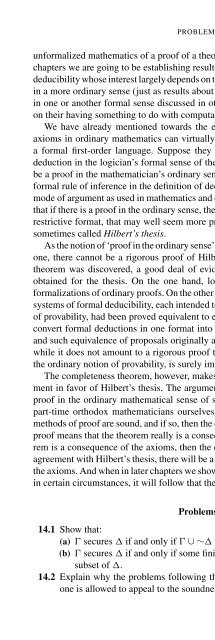Computability and Logic
Computability and Logic
Computability and Logic
You also want an ePaper? Increase the reach of your titles
YUMPU automatically turns print PDFs into web optimized ePapers that Google loves.
PROBLEMS 185<br />
unformalized mathematics of a proof of a theorem from a set of axioms. For in later<br />
chapters we are going to be establishing results about the scope <strong>and</strong> limits of formal<br />
deducibility whose interest largely depends on their having something to do with proof<br />
in a more ordinary sense (just as results about the scope <strong>and</strong> limits of computability<br />
in one or another formal sense discussed in other chapters depend for their interest<br />
on their having something to do with computation in a more ordinary sense).<br />
We have already mentioned towards the end of Chapter 10 that theorems <strong>and</strong><br />
axioms in ordinary mathematics can virtually always be expressed as sentences of<br />
a formal first-order language. Suppose they are so expressed. Then if there is a<br />
deduction in the logician’s formal sense of the theorem from the axioms, there will<br />
be a proof in the mathematician’s ordinary sense, because, as indicated earlier, each<br />
formal rule of inference in the definition of deduction corresponds to some ordinary<br />
mode of argument as used in mathematics <strong>and</strong> elsewhere. It is the converse assertion,<br />
that if there is a proof in the ordinary sense, then there will be a deduction in our very<br />
restrictive format, that may well seem more problematic. This converse assertion is<br />
sometimes called Hilbert’s thesis.<br />
As the notion of ‘proof in the ordinary sense’ is an intuitive, not a rigorously defined<br />
one, there cannot be a rigorous proof of Hilbert’s thesis. Before the completeness<br />
theorem was discovered, a good deal of evidence of two kinds had already been<br />
obtained for the thesis. On the one h<strong>and</strong>, logicians produced vast compendia of<br />
formalizations of ordinary proofs. On the other h<strong>and</strong>, various independently proposed<br />
systems of formal deducibility, each intended to capture formally the ordinary notion<br />
of provability, had been proved equivalent to each other by directly showing how to<br />
convert formal deductions in one format into formal deductions in another format;<br />
<strong>and</strong> such equivalence of proposals originally advanced independently of each other,<br />
while it does not amount to a rigorous proof that either has succeeded in capturing<br />
the ordinary notion of provability, is surely important evidence in favor of both.<br />
The completeness theorem, however, makes possible a much more decisive argument<br />
in favor of Hilbert’s thesis. The argument runs as follows. Suppose there is a<br />
proof in the ordinary mathematical sense of some theorem from some axioms. As<br />
part-time orthodox mathematicians ourselves, we presume ordinary mathematical<br />
methods of proof are sound, <strong>and</strong> if so, then the existence of an ordinary mathematical<br />
proof means that the theorem really is a consequence of the axioms. But if the theorem<br />
is a consequence of the axioms, then the completeness theorem tells us that, in<br />
agreement with Hilbert’s thesis, there will be a formal deduction of the theorem from<br />
the axioms. And when in later chapters we show that there can be no formal deduction<br />
in certain circumstances, it will follow that there can be no ordinary proof, either.<br />
Problems<br />
14.1 Show that:<br />
(a) Ɣ secures if <strong>and</strong> only if Ɣ ∪∼ is unsatisfiable.<br />
(b) Ɣ secures if <strong>and</strong> only if some finite subset of Ɣ secures some finite<br />
subset of .<br />
14.2 Explain why the problems following this one become more or less trivial if<br />
one is allowed to appeal to the soundness <strong>and</strong> completeness theorems.


